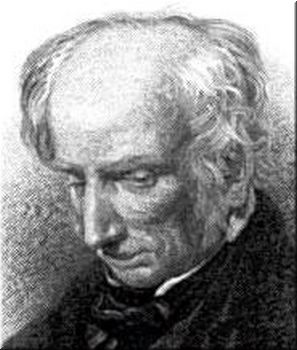WILLIAM
WORDSWORTH

That very day,
From a bare ridge we also first beheld
Unveiled the summit of Mont Blanc, and grieved
To have a soulless image on the eye
That had usurped upon a living thought
That never more could be. The wondrous vale
Of Chamouny stretched far below, and soon
With its dumb cataracts and streams of ice,
A motionless array of mighty waves,
Five rivers broad and vast,made rich amends,
And reconciled us to realities; ...
Whate'er ìn this wide circuit we beheld,
Or heard,was fitted to our unripe state
Of intellect and heart. With such a book
Before our eyes, we could not choose but read
Lessons of genuine brotherhood, the plain
And universal reason of mankind,
The truths of young and old.
La
visita alle Alpi, tratta dal sesto libro del Preludio, è un tipico esempio di
sublime narrativo, come è stato teorizzato da Kant, in cui la ricompensa del
sublime subentra al difetto iniziale dello spirito poetico.
La
prima vista del Monte Bianco provoca dolore, ansia, delusione nei viaggiatori,
profilando un’insuperabile incompatibilità e alienazione tra uomo e natura.
Ma a ciò segue subito una seconda fase comprensiva, in cui si scopre una
perfetta armonia tra uomo e natura, perché la natura è diventata una totalità
unificata intelligibile, il libro di Dio.


